| We're starting a new weekly post, Paula's Pick. Paula works at the Booknook on Tuesday around lunchtime and loves fiction, so here is Paula's first pick. Family Tree by Barbara Delinsky. From Amazon: "For as long as she can remember, Dana Clarke has longed for the stability of home and family. Now she has married a man she adores, whose heritage can be traced back to the Mayflower, and she is about to give birth to their first child. But what should be the happiest day of her life becomes the day her world falls apart. Her daughter is born beautiful and healthy, and in addition, unmistakably African-American in appearance." According to Paula, it's a great read, so pick it up for just a buck! |
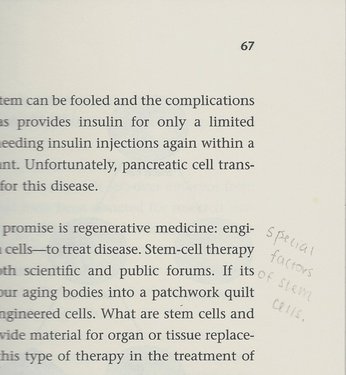 I was reading another great book on genetics, Genetic Twists Of Fate when, horror of horrors, I found that someone had been making notes in this library book! So in addition to the rule about not stealing library books, please note that it is not OK to write in library books! Please!  The Eternity Brigade is another great read, similar to The Forever War, but with one big exception: The accuracy of its predictions. The Forever War predicted things that actually came true, like the legalization of marijuana, or the government encouraging homosexuality to control population growth. The Eternity Brigade doesn't use wormholes to take us into the future, instead, soldiers are frozen at the end of a war and then thawed out at the start of the next war, keeping the cadre battle hardened without having to maintain a standing army during peacetime. Later the process skips freezing and uses something similar to Star Trek's transporter to digitize the soldiers and keep them in memory until needed, and of course later the Army gets the bright idea to mass produce them to make entire regiments out of one guy, but don't let me spoil it for you! In The Eternity Brigade, written in 1980, not long after The Forever War, the future is much less fun, much bleaker than The Forever War. Hawker is frozen for 12 years, fights a war in China, survives, then is repatriated back to the States, where he finds conditions pretty horrible. Gasoline is almost non-existent, energy is extremely expensive, and even though he and his buddies are filthy rich after their twelve years of monthly pay has been compounded with interest as they slept, they have to take a bus to New York, whereas before they were frozen they flew cheaply and easily to Las Vegas on just the signing bonus. In this future world, citizens have to have a photo ID card to travel, and permission to enter the cities to keep out illegal aliens, troublemakers and terrorists. As gripping as Stephen Goldin's tale is, it's hard to read something that turned out to be so wrong. But, remember, at the time everyone thought that we would run out of oil, and things would get worse and worse over time.Perhaps authors in search of character motivations in futuristic novels should read this book, The Bottomless Well. 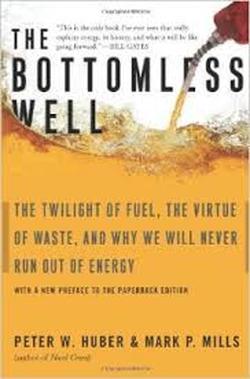 This book tells us that there will never be a shortage of energy, ever again. How many of us wasted our lives worrying that the future was going to be bleaker than the past, when in fact, it's gotten better! Malthus predicted that the whole world would starve to death before the 1900s, instead, in the 21st century, the biggest problem the poor have is obesity! I guess Obamacare is going to have to cover Jenny Craig diets! Oh wait, that turned out to be another red herring too. And since we haven't run out of fuel (we never ran out of whale oil and ambergris either, we just found better alternatives) they have to come up with other lies, like Greenhouse Gas emissions to get us to stop burning "fossil fuels." The Bottomless Well, written in 2005 predicted a glut of energy even before Fracking became a household word. Now the price of oil is dropping again, proving that we will never run out of energy, and making those Prius owners look pretty stupid. It's really hard to read The Eternity Brigade now, given that it was so wrong about the future. It just seems so pointless, obviously we are not going to learn anything from this author because he was so wrong. So instead of reading science fiction, or watching the "fake news" predict the next global catastrophe that will never come about, maybe you should try reading a book like The Bottomless Well, which, sorry to say, you'll have to find elsewhere because the library doesn't have a copy. 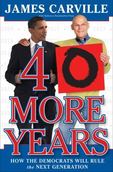 Checking the library site I found some interesting trends. I know I have poked fun at this book more than once, but it deserves it. One copy, zero holds. Kind of like a book about a flat earth immediately after it's confirmed that the earth is round.  Trump's book, The Art Of The Deal, 5 copies, 13 holds.  Barack Obama, 3 copies, zero holds.  David Horowitz' 28th book, Big Agenda, 7 copies, 26 holds. Clearly it's a new day in America, and time for some more books!
Often when two authors work on a book, one is a famous person and the other is the real writing talent. Origins by Richard Leakey (son of Louis Leakey) and Roger Lewin always seemed to be tilted towards Roger's writing, which IMHO subverted Richard's beliefs, so much so that they had to release a new book, Origins Reconsidered, but in this version, Roger is listed as a "contributor," not an author. Other collaborations are more balanced, Richard J. Herrnstein and Charles Murray in The Bell Curve, Vincent Sarich and Frank Miele in Race are good examples. But the one collaboration that really touched me recently is Alan S. Miller and Satoshi Kanazawa in the book, Why Beautiful People Have More Daughters. Kanazawa is widely hated for his views. Interestingly it's OK to hate non-white people as long as they hold the wrong views, but does he deserve it? In the Preface, Kanazawa tells the story of how WBPHMD came about. Alan asked Satoshi to help him work on another book and gave him full co-authorship in exchange for writing just a couple of chapters. "It was a very generous offer," he says, so he agreed. During the collaboration Satoshi converted Alan to Evolutionary Psychology and they talked about it all the time after the new book came out.. Then they decided to work together on a book for generalists and non-scientists explaining the basics of EP or EvoPsych as it's known. They dove into writing the new book and suddenly Alan fell ill with Hodgkin's disease. Despite an optimistic prognosis Alan became so ill that he couldn't do much work, but completed a couple of chapters while Satoshi worked on his own chapters. Alan died just two years later, at age 44, too young for such a bright mind. Satoshi decided to continue work on WBPHMD as a way of preserving Alan's contribution to the field, but because his dear friend wasn't around to proof, argue and contribute, Satoshi tells us this touching admission:
"Thus Alan never got a chance to see the final manuscript or approve the subsequent revisions that I made to his chapters. I am keeping Alan as the first author of this book because that was the arrangement we agreed upon when we began our collaboration, and because the book was originally his idea. However, the reader should know that I am solely responsible for the entire contents of the final manuscript, which Alan did not have a chance to see or approve. Alan should be credited as the genius behind this book, while any remaining shortcomings should be attributed to me." Quite a guy, quite a guy. 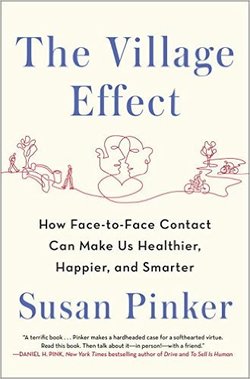 After discovering Susan Pinker (see Are Sex Differences Real?), the sister of Steven Pinker, author of many great books, I had to root out some more Susan Pinker books, and I found one in the library! The Village Effect was originally going to be called Face To Face, and the cover graphic pretty much echos that title, implying that the cover was complete before the final title was chosen. In this book, Susan tells us that Facebook, SnapChat, Twitter, etc are nowhere near sufficient to replace real face to face contact. And face to face contact can make you healthier, happier and smarter, as she proves all over the book. I could not agree more. I travelled all over the world to bring technology to people in distant lands. Sure, I can email you a document, a video, a lecture, even Skype you, but until we are face to face, you will never understand what I am saying. It's rather timely, as I recently was subjected to a "time out" from Facebook thanks to a wacked out stranger who jumped down my throat like a homeless guy with an axe to grind jumping into a private conversation at a bus stop. I realized that while I was saying nothing more indefensible than something you might find in a book by Dr. Richard Lynn, Dr. Jean Philippe Rushton or Dr. Steven Pinker himself, people don't understand that FaceBook is not a replacement for face to face interaction. It's too easy to unwittingly step on someone's toes because you don't really see them as individuals, and if you couch your posts so much that you don't offend someone, you'll never say anything of value to anyone. For that reason, I dropped the FOVCL Facebook page as well as my own personal Facebook page. I will keep up the Booknook Blog, since it's not forced down your throat. You can read it or not, your choice, like borrowing a book. If you don't like it, you can close it up, take out your bookmark and turn it back in, no harm done. |
Booknook Staff
Volunteers crazy about books. Categories
All
Archives
June 2024
|


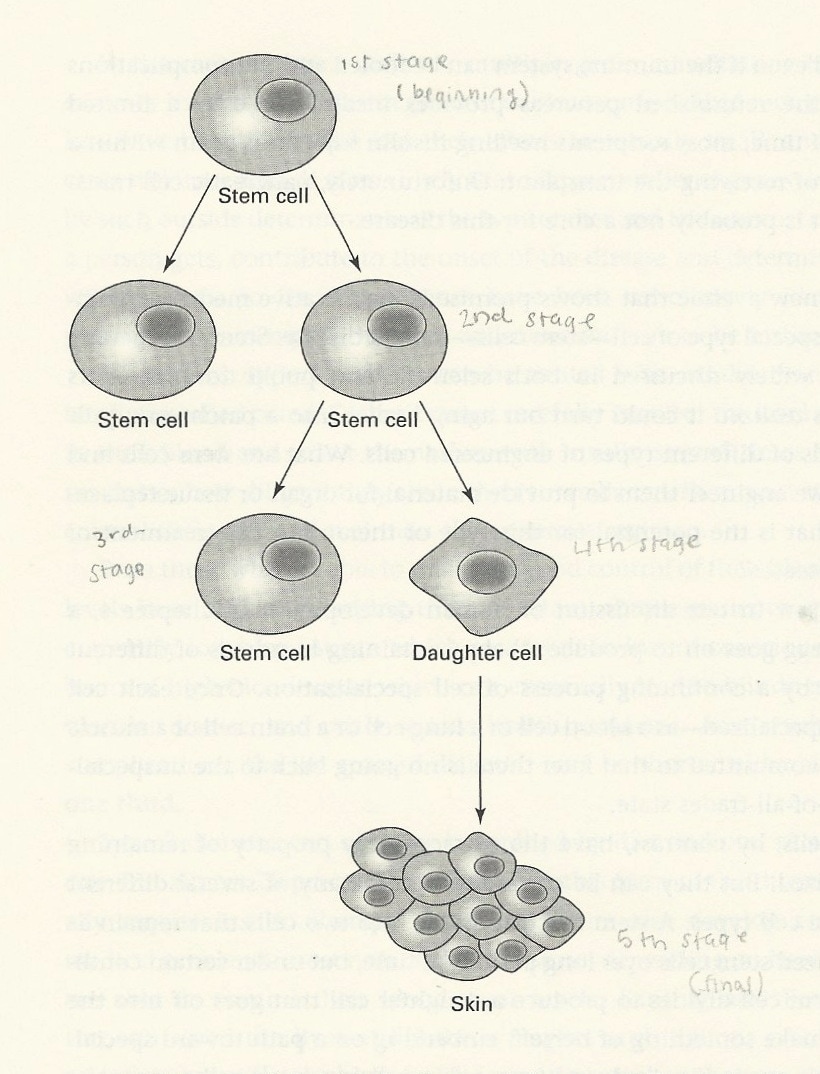

 RSS Feed
RSS Feed